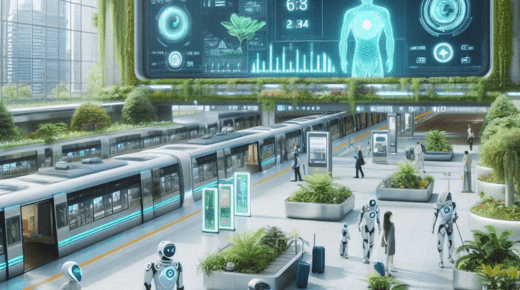Sustainable travel isn’t just a buzzword; it’s a necessity in our rapidly changing world. As I see it, the integration of artificial intelligence (AI) is revolutionizing this space, making eco-friendly choices more accessible and efficient. From personalized travel recommendations to optimizing routes for minimal environmental impact, AI’s potential is vast.
Imagine planning a trip where your carbon footprint is minimized without sacrificing comfort or convenience. AI-driven platforms can analyze vast amounts of data to suggest the greenest hotels, the most efficient transportation, and even activities that support local communities.
It’s not just about reducing harm; it’s about making travel a force for good. For more insights on how AI is transforming sustainable travel and promoting responsible tourism, explore AI-driven sustainable travel solutions that focus on eco-friendly innovations and community support.
Understanding Sustainable Travel
Sustainable travel takes into account the environmental, social, and economic impact of tourism. It emphasizes minimizing the negative effects of travel while maximizing the positive contributions to local communities and ecosystems. This concept aims for long-term conservation of natural and cultural resources.
Focusing on reducing carbon footprints, sustainable travel promotes eco-friendly transportation options like electric vehicles, bicycles, or public transit. Leveraging renewable energy resources and adopting low-waste practices are other critical components. Travelers should consider the longevity of tourists’ benefits to local economies by supporting local businesses and using services that offer fair wages and good working conditions.
For example, eco-lodges utilize sustainable materials for construction and renewable energy sources. They offer guests opportunities to participate in conservation activities. Additionally, community-based tourism involves locals in providing services and experiences, ensuring that the economic benefits of tourism are distributed evenly.
Lastly, protecting biodiversity is central to sustainable travel. Practices include avoiding activities that harm wildlife and habitats and engaging in conservation efforts. Responsible wildlife tourism educates travelers about local species and ecosystems.
Understanding these elements helps travelers make informed choices that contribute positively to global travel’s sustainability.
The Role of AI in Modern Travel Industry
AI is transforming the travel industry by enhancing efficiency and sustainability. Advanced algorithms analyze vast amounts of data to make travel more seamless and eco-friendly.
AI-driven Itinerary Planning
AI optimizes travel itineraries by considering factors like time, cost, and environmental impact. Machine learning algorithms analyze user preferences and constraints to create personalized schedules. For example, AI can recommend off-peak travel times to reduce carbon emissions. Real-time data allows adjustments to travel plans, ensuring minimal disruptions. This eliminates guesswork and reduces waste, making travel more efficient and sustainable.
Personalized Recommendations
AI provides personalized recommendations by analyzing user behavior and preferences. It suggests eco-friendly hotels, sustainable transportation options, and local attractions that support conservation efforts. AI-driven platforms like Google Travel use data to tailor suggestions to individual travelers. For instance, frequent travelers receive recommendations for green-certified accommodations. This ensures that travelers make choices aligned with their sustainability goals.
Environmental Impact Mitigation
Artificial intelligence (AI) helps mitigate environmental impacts by optimizing resource use and reducing carbon emissions during travel.
Optimizing Resource Use
AI optimizes resource use by analyzing vast amounts of data from various sources. Machine learning algorithms process information from hotels, transportation providers, and local attractions to identify inefficiencies. For example, AI can detect high energy consumption patterns in hotels and suggest actionable changes. Smart systems can adjust lighting, heating, and cooling based on occupancy, significantly reducing energy use. AI-driven platforms also facilitate efficient water management by predicting usage patterns and preventing wastage through real-time monitoring.
Reducing Carbon Emissions
AI contributes to reducing carbon emissions by enabling more sustainable travel choices. Predictive analytics allow AI systems to recommend alternative routes that minimize fuel consumption. AI-integrated transportation apps can suggest using eco-friendly public transport rather than taxis or personal cars. Real-time data analysis provides the most efficient travel options, reducing unnecessary travel time and associated emissions. AI also identifies opportunities to use renewable energy sources within travel infrastructure, further diminishing the travel sector’s carbon footprint.
Case Studies: Success Stories
Artificial Intelligence (AI) is central to enhancing sustainable travel. Here’s a look at real-world applications and their impressive outcomes.
Smart Cities Initiatives
Singapore’s Smart Nation initiative shows AI at work. By integrating AI into urban planning, transportation, and resource management, the city improves energy efficiency. AI systems monitor energy usage, optimize street lighting, and manage water supplies. Such initiatives reduce wastage and lower carbon footprints.
Barcelona’s smart city projects also lead by example. The city uses AI to manage traffic, reducing congestion and pollution. Sensors and predictive analytics help optimize traffic flow. The city achieves real-time adjustments, contributing to better air quality and sustainable urban living.
Eco-friendly Transportation Solutions
AI impacts transportation significantly. Tesla’s Autopilot leverages AI for eco-friendly driving. The system’s algorithms optimize routes, maintain efficient speeds, and reduce unnecessary acceleration. This minimizes fuel consumption and emissions.
Public transport systems also reap benefits. London uses AI for its bus network. The system analyzes traffic patterns and rider demand, optimizing routes and schedules. This reduces idle time, fuel usage, and overall carbon emissions, making public transportation more sustainable.
Challenges and Ethical Considerations
AI enhances sustainable travel but brings challenges and ethical considerations.
Data Privacy Concerns
AI systems collect vast amounts of personal data to tailor travel experiences. This data may include location, preferences, and travel habits. Without strict data protection measures, there’s a risk of misuse or unauthorized access. Companies must implement robust encryption and strict access controls to protect travelers’ information.
Ensuring Fair Access
Sustainable travel solutions need to be accessible to all, not just those who can afford advanced technologies. AI can potentially create a divide, where only affluent travelers benefit from eco-friendly options. Efforts must focus on making AI-driven sustainable travel options affordable and inclusive to ensure equitable access for everyone.
Future Prospects of AI in Sustainable Travel
AI in sustainable travel promises innovative advancements. Autonomous vehicles can revolutionize transportation by reducing emissions and traffic congestion. Waymo’s self-driving cars offer a glimpse into a future where ridesharing reduces the need for individual car ownership.
AI’s predictive analytics enhance travel planning. Machine learning algorithms analyze patterns to forecast demand, enabling efficient resource allocation. Airlines like Lufthansa use AI to optimize flight routes, reducing fuel consumption.
AI can support renewable energy use in hotels and accommodations. Smart grids and AI-powered energy management systems adjust power usage based on real-time data. Marriott has implemented AI-driven energy conservation measures in several properties, showcasing potential benefits.
AI enhances wildlife conservation in travel destinations. Drones and AI monitoring systems track animal populations and habitats, aiding in the preservation of biodiversity. Projects like Air Shepherd use AI to combat poaching, integrating technology with sustainable travel efforts.
AI improves waste management in tourist areas. Automated systems sort recyclable materials, reducing landfill contributions. Cities like Tokyo leverage AI-based waste management solutions to maintain cleanliness and sustainability in crowded tourist spots.
Future developments include AI-driven sustainability certifications for travel agencies. These platforms can analyze and verify eco-friendly practices, providing transparency for environmentally conscious travelers. Green Key and EarthCheck are leading examples of such AI-driven certifications, ensuring reliable and verified sustainable travel options.

